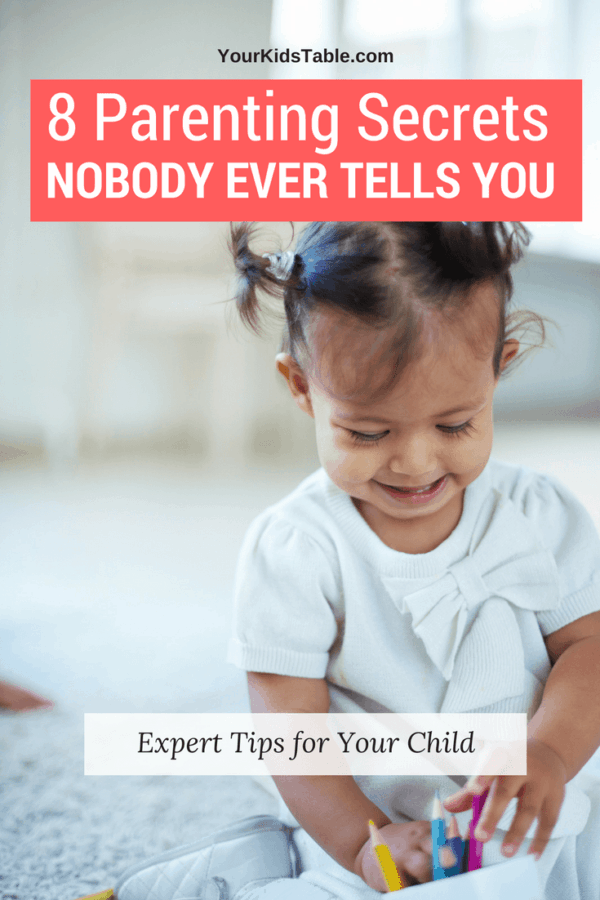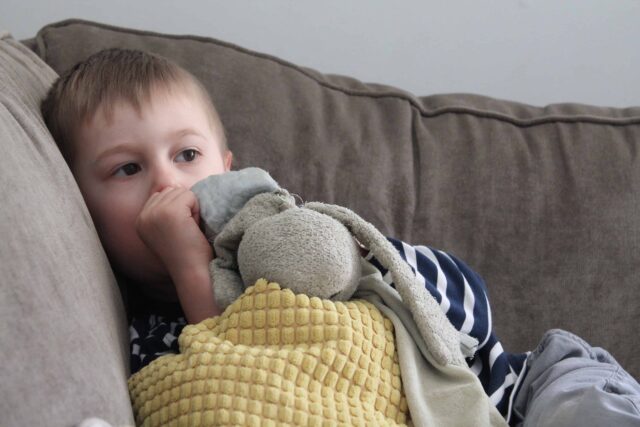Kids don’t come with a handbook, and it’s so easy to never be told valuable parenting advice from an expert that can change how you parent and help your child develop. I’m revealing 8 of these surprising parenting tips…
Did you ever have one of those parenting moments when you want to scream, “Why wouldn’t ‘they’ tell me that?” Almost from the time we bring our babies home from the hospital we soon discover all sorts of hidden mysteries about the little babies and then toddlers and older children. I guess it comes with the gig.
But, as a pediatric occupational therapist, I realized long ago some of these little secrets are never discovered and when they’re not, it makes parenting a lot harder.
Not to mention that these parenting tips are likely to help you help your child better!
That’s why I’m going to share 8 parenting secrets that nobody tells Moms and Dads to give you clarity on what you need to worry about, what you don’t, and to understand just what the heck to expect.
8 Secret Parenting Tips That You Ought To Know
1. Vegetables taste extremely bitter to kids, that’s why so many refuse them!
So many parents tell me that when their child was a baby they absolutely loved all sorts of vegetables, but sometime after turning one, they stopped eating them. Now their child is 5 and they still are refusing! While it’s more than frustrating and worrisome, because we want them eating all those wonderful vegetable nutrients, there’s actually some science behind why kids tend to avoid veggies.
Around the age of 1, kid’s palates become much more sensitive and their taste receptors for bitter flavors are enhanced. Now the broccoli that they used to gobble down by the spoonful is tasting very bitter, which means they aren’t interested.
Scientists believe this is a protective response to early humans living in the wild. Toddlers and young children needed to not accidentally eat a poisonous plant. The good news is that there’s hope. Veggies can be made to taste more pleasant to kids, check out vegetable recipes for kids to get some inspiration.
Also, to cover the vegetable gaps in my home, I give my kids a natural gummy that includes tons of fruits and veggies. It’s made a big difference in their health, find out more here.
2. Kids that are strong-willed, hyperactive, weird, or overly sensitive, may have something more going on…
All of those labels may be valid, but over and over again I’ve seen that those terms may actually point to the way a child processes sensory information. Before you hit the panic button, know that each one of us, and our kids, have unique sensory preferences. We like the way some things feel (swaying on a porch swing) and can’t stand others (whining from a toddler).
Okay, so those are my sensory preferences, but you get the point.
When kids are stubborn, wild, do odd things, or shy away from seemingly everything, it could be because of their sensory preferences. And, these sensory preferences can get really distracting for kids. That’s why it’s important to figure out what they are and how to help them. To get started with this, check out What is a Sensory Diet.
And for more info on popular sensory questions, click here.
3. Babies don’t need teeth to eat
It’s shocking, isn’t it?! But, it’s very true.
Many times, it seems logical to reason that babies that are having difficulty learning to eat, gagging, and refusing foods is due to their lack of teeth. Thankfully, it has nothing to do with it. Babies should be eating and chewing food on the back of their gums, where their molars will be. Those teeth don’t come in for a long time, in some cases. Their gums are plenty strong enough to eat typical table foods.
If your baby is having trouble eating, grab this free printable guide about how to help them AND check out How to Transition to Table Foods, too!
4. Thumb sucking can be a good thing
Thumb sucking is extremely calming for kids that are doing it, in a very similar way to using a pacifier. However, unlike the pacifier, you can’t take it away, and socially as parents, we can feel judged for kids that still suck their thumbs. I’m starting to wade into that now, as my 3 year old still frequently puts his thumb into his mouth.
And, while I think it’s good to teach him some boundaries around it, I know it’s soothing and he will eventually outgrow it. I have to also mention that some kids with sensory needs or preferences really need this oral input.
Fighting the thumb, in these cases, can be a battle that isn’t worth having, or that could even be detrimental.
5. Picky eating is normal, but extreme picky eating is different than typical picky eating and needs more help
Just like the bitter tasting vegetables we talked about above, the heightened taste buds at age 1-2 make way for a very typical picky eating phase that many children go through. This phase usually lasts through 3.5 to 5 years of age, and is hallmarked by kids that prefer certain types of food and have a fairly limited diet.
Average American picky eaters usually love chicken nuggets, pizza, chips, and macaroni and cheese. They often have at least a few fruits they’ll eat and maybe a couple of veggies too.
But, for some picky eaters this is just the tip of the iceburg. Some have such a limited diet that they’ll only eat foods prepared a certain way (aka food jags), will only eat while playing with toys, a tablet, or watching tv (aka distractions), and have less than 15 foods in their diet (in some cases only 2-3).
This is usually called extreme picky eating, problem feeding, or even Avoidant Restrictive Food Intake Disorder (ARFID). While the terminology isn’t important, it is that parent’s know they’re not alone because managing it can suck the life out of you. But, there are ways to get help through feeding therapy and my free picky eating workshop.
5. Letting kids get messy is really GOOD for them (and they actually need it!)
Don’t hate me, but it’s true. Babies that get messy while eating and get into everything are often very good eaters, it helps them learn about their food and develops their sensory system further. Click here to read more about why.
But, the mess doesn’t just have to come with eating, using sensory bins and messy play are extremely powerful too, especially for kids that are tactile sensitive. (Of course, sensory seekers LOVE getting messy, so let them go at it!)
Kids that don’t like get to messy, usually need to, because their sensory system isn’t processing the “messy input” well. This can interfere with eating, participating in activities, and even development. But, it’s important to take it slow with tactile defensive kiddos, never forcing. Over time, the messy play can be a total game changer.
6. Babies can drink from a straw at 9 months old
It’s so cool to teach a baby to drink from a straw! The developmental benefits are amazing. You just want to watch for frequent coughing. If your baby is coughing a lot while using a straw, the fast liquid might be too much for them to handle just yet.
You can learn to teach your baby how to drink from a straw, it’s easier than you might think.
7. It takes a child at least 11 tries of a food before they know if they like it or not
Seriously! And, this is what I tell my kids every time they taste something and say, “I don’t like it.” I’m also careful to never say, “Do you like it?” One, because I don’t want to give them the chance to say “no”, and they likely will, but they also really don’t know.
New foods, like shepherd’s pie or brussel sprouts may be old hat to us, but for a kid, it might as well be a plate of fried grasshoppers.
It takes time to experience the look, smell, feel, and taste of food for many kids. And, if you’ve got a picky eater than they need a lot of time. Giving kids lots of opportunities to try foods along with my top picky eating tip (not pressuring them to eat) can make a huge difference in what a child is willing to eat.
8. After a child turns 12 months old, they only need 16 oz (that’s 2 cups of milk) a day!
Transitioning to less milk and more foods can be an overwhelming time for parents, it was for me. And, it can be really confusing because up until their first birthday, they are relying solely on milk. They are supposed to be drinking tons of it, but at 1 year old their nutritional needs shift. Of course, decreasing how much milk your toddler drinks is meant to be a gradual process. Check out How Much Milk Does a Toddler Need for more details!
If you have a picky eater that’s drinking a lot of milk, it’s often best to give it at mealtimes or before bed, and if there’s any weight concerns, you’ll want to check with your doctor as well.
Did you learn anything new? I hope these 9 tips prevent you from the frustration of not knowing some helpful developmental facts about kids. Being a parent can feel utterly frustrating at times, but today you’ve got a couple more tools in your back pocket!
Grab the 9 Steps to Improve Eating Free Printable
Whether you’re the parent of a picky eater or you simply want to encourage good eating habits that will last throughout your child’s life, this free printable gives my 9 steps to improve your child’s eating.
Grab your free copy to download and/or print here.
More Parenting Tips
What to Do When Baby Won’t Eat Solids: 7 Simple Steps
Fun Plates, Forks, and Other Cool Stuff that Get Kids to Eat
The Essential One-Stop Guide for Easy Toddler Meals
How to Handle Dessert with Picky Eaters
Did you pin this?
Alisha Grogan is a licensed occupational therapist and founder of Your Kid’s Table. She has over 14 years experience with expertise in sensory processing and feeding development in babies, toddlers, and children. Alisha also has 3 boys of her own at home. Learn more about her here.




I like these parenting tips
I love your website and often share it with parents and friends with toddlers (I am an SLP)! Thank you for all of the valuable information!
I have a question… I have a family friend whose child is 20 months. We just vacationed together and I was able to observe some of their struggle. Their son is fine with mom and dad, but panics and cries when anyone else comes near. It has become very isolating and they feel like they cannot get out and go places without him being very upset and overwhelmed. Even at the grocery store, he looks down and makes no eye-contact. If someone approaches or speaks to him he gets very upset. Even neighbors that come by to say hello when he is outside, he will start crying or saying “bye, bye,” over and over again. Even family gets the same reaction, to the point she is not sure she will be able to celebrate his birthday.
I have done some research and am not sure if this is sensory or behavioral or probably a combination of both. I would appreciate any guidance.:)))
Cheryl Mitchell
Oh thank you Cheryl!
It’s hard to say what could be going on, does he show any other sensory red flags? For instance, does he not like movement (being rough housed, swinging, etc.) Or, is he sensitive to touch?
Another thing that they may have already considered is possibly Autism? He’s young so it can be hard to tell, and if he has no other signs, it could absolutely not be that, but I wanted to mention because that’s a common behavior associated with the diagnosis.
Hope this gives you a little direction!
Hi there- i clicked on the link for the gummies but it just brought up a webpage with several products? which ones do you use with your kiddos? My daughter is 3 and has several allergies so I’ve been looking for something like this. Thank you 🙂
Warmly,
Bethany
I use the Orchard and Garden Blend chewables for my kids. There is also a Vineyard Blend chewable that we haven’t tried yet, but is also an option.